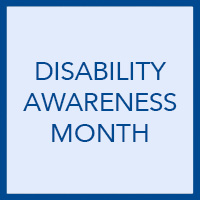Disability Awareness Month: Encourage Appropriate Interactions
October 22, 2018

The Accessibility Committee and the Academic Resource Center (ARC) are providing weekly disability and accessibility tips this month for Disability Awareness Month.
Tip #4: Encourage Appropriate Interactions
Sometimes, individuals might feel unsure about how to interact with people with disabilities, causing them to avoid building connections. At Webster, we want to create a welcoming and respectful environment for all students, faculty and staff members.
Tips to encourage positive, appropriate interactions
- Treat adults as adults. Speak directly to the person with a disability. Do not communicate through another person. If the person uses an interpreter, look at the person and speak to the person, not the interpreter.
- Avoid patting people who use wheelchairs on the shoulder or head. Never touch a person's wheelchair without permission as the chair is a part of the body space of the user. If possible, sit down when talking, so that you are at the person's eye level.
- When introduced, offer to shake hands. People with limited hand use or artificial limbs can usually shake hands. It is an acceptable greeting to use the left hand for shaking.
- If you are a sighted guide for a person with a visual impairment, allow the person to take your arm at or above the elbow so that you guide rather than propel. When first meeting a person with blindness, identify yourself and any others who may be with you.
- When talking with a person with a speech impairment, listen attentively, ask short questions that require short answers, avoid correcting and repeat what you understand if you are uncertain.
- When speaking to a person with a hearing impairment, look directly at the person and speak slowly. Avoid placing your hand over your mouth when speaking. Written notes may be helpful for short conversations.
- When an individual uses a service dog, remember to speak directly to the dog handler, not to the dog. Do not pet or distract the dog with food, toys or other attention. Respect the relationship between the handler and the dog, and do not interfere with commands or by separating the pair.
To read previous Disability Awareness Month tips, follow the links below.
